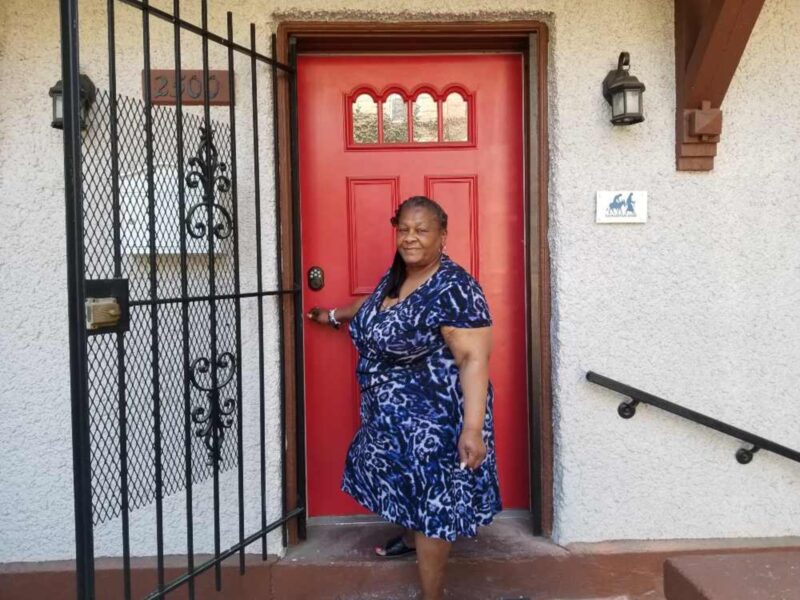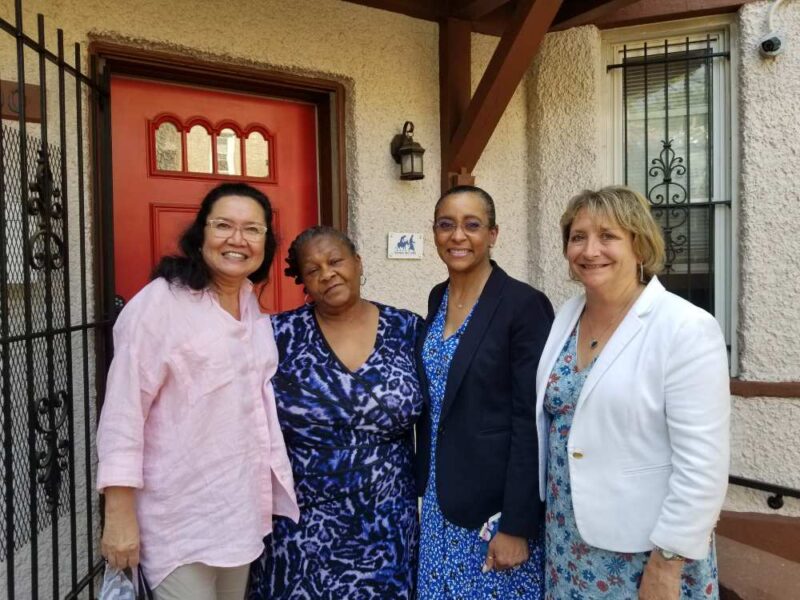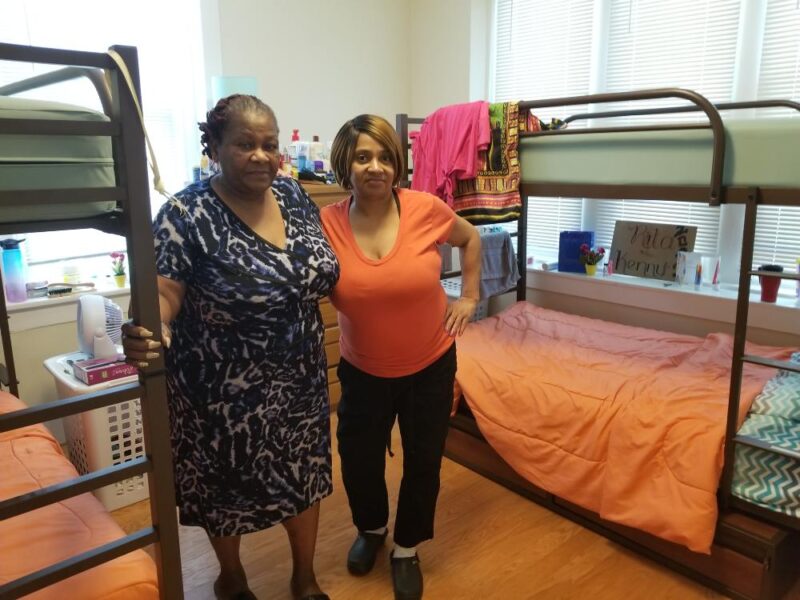DC’s First Transitional Drug Treatment Program for Women Opens
June 09, 2021 | News

Jackie Pearson, a Samaritan Inns client, opens the door to her new transitional housing. Photo by Sloane Airey.
The District is now home to its first transitional drug treatment program for women.
Nestled in between Adams Morgan and Lanier Heights, the three-story Tudor building opened its wrought iron door in November to half a dozen women seeking sobriety who are homeless or at-risk. The DC Department of Behavioral Health (DBH) awarded Samaritan Inns a $1.2 million contract to provide substance use disorder services, including two years of support for this program as part of DC’s push to curb homelessness.
The six-month treatment program sits on Ontario Road NW and typically accepts its clients from various 28-day residential drug treatment programs across the District. Women who go on to attend this longer transition program live full-time in the building while receiving a personalized regimen of therapy and medical care, and later, assistance finding jobs and housing. In a recent interview with Street Sense Media, staff said their inaugural class of clients range in ages from 29 to 69.
“We are really seeing a lot of women with a long, long history of substance abuse,” said Clinical Director Chrissy Buswell.

Photo by Sloane Airey.
Jacqueline “Jackie” Pearson joined the program in February after struggling with addiction to heroin for 45 years.
“I had four fentanyl overdoses in November,” Pearson told Street Sense Media. “Three of them I was taken to the hospital to come back. The fourth one was the one that did it: My son had to breathe in my mouth.”
Pearson was watching her 2-year-old grandson when she overdosed the last time, and said the realization of what could have happened to him while she was unconscious was a wake-up call. Previously she said she would lie to her son — asking for extra money she would use to buy opiates — but after he resuscitated her and realized the extent of her addiction, her son called her selfish and self-centered.
“I didn’t care anything about manipulating him, I just cared about getting high,” said Pearson. “But I hurt my baby, I really hurt him. When I talk about him, I can see how he looked at me — his eyes had so much pain in them. I was so selfish, I never thought about how much pain I had inflicted on my kids.”
Coalition for the Homeless Executive Director Michael Ferrel said substance abuse disorder (SUD) treatment programs like this new Samaritan Inns one are an important part of combatting homelessness because they serve people whose relationships are fraying.
People who become addicted to drugs or alcohol may find themselves becoming homeless once they reach a point where they are no longer able to maintain employment or relationships with family and friends, Ferrel said. “And that homelessness is compounded by the fact that they’re struggling with an active addiction.”
‘You never know exactly what the experiences are for the women involved’
In a statement to Street Sense Media, DBH said the new Samaritan Inns program “complements” the city’s other treatment program for pregnant women or mothers.
“These two programs reflect our commitment to address the unique needs of women and mothers to remove any barriers to treatment and provide a safe, nurturing environment which can lead to better outcomes,” the department wrote in an email.
Ferrel noted that although several successful SUD treatment programs like Narcotics Anonymous are co-ed, he could see a benefit to a residential program dedicated to women.
“For some women, because they have been victims of domestic violence, being around men in general in very close proximity like a transitional program might be problematic for some of the women from a therapeutic perspective,” he said.
Pearson said she completed several stints in 28-day recovery programs but always relapsed because she wasn’t ready to be sober. One of the things she’s doing differently now in the Samaritan Inns six-month program is addressing the trauma underlying her drug use.
“My addiction started as a kid because I was raped at six years old. I was being raped just constantly, constantly, constantly,” she said. “I never, ever told my mother because I always looked at my mother as a big strong person because she was a single parent. And I figured if I told her something like that she knew she couldn’t protect me and it would affect her. And that’s the kind of attitude I had with people: I always take care of other people and don’t think nobody’s supposed to take care of me.”
Pearson started smoking marijuana and taking psychedelics with friends at concerts, then progressed to snorting PCP and then heroin.
“What started as a recreation became a problem for me,” she said. “And I started going back and forth to jail.”
Buswell at Samaritan Inns is working to include trauma-informed therapy techniques like trauma recovery groups to the women’s program to help clients like Jackie who have experienced sexual violence.
“You never know exactly what the experiences are for the women involved,” Ferrel said. “Some women maybe become homeless and it wasn’t due to domestic violence, but while on the streets they are abused and raped.”
“These people keep on encouraging me, something that I need, that I was scared to ask for,” said Pearson of the staff at the program. “I don’t have to ask them, that’s what they do, that’s their job. And they let you know that’s their job: they’re here for you. And that’s why I’m still here in this program.”
‘Women may fall through the cracks a bit’
Two bunk beds with bright comforters line the bedroom Pearson shares with her roommate, Rita Lewis. Both women have claimed the bottom bunks and decorated the sparse but bright room with the things that remind them of home: pictures and posters from loved ones, a fan and books brought by family.
The top bunk beds are empty in deference to the CDC’s COVID-19 social distancing guidelines. Under those precautions, staff say they can currently house up to 10 women in the three-story house but they have been licensed to house up to 50 people in the future.

Jackie Pearson and her roommate, Rita Lewis, in their Samaritan Inns room. Photo by Sloane Airey.
The opening of a new drug treatment program comes at a needed time. Nationwide, drug overdose deaths and alcoholic liver disease rates — particularly for women — rose sharply during the pandemic. In DC, the most recent medical examiner reports indicate drug overdoses caused the majority of accidental deaths. Fentanyl overdoses alone was responsible for half the accidental deaths in 2018 and 2019, per the reports.
[Read more: Nearly half of the fatalities among homeless people in D.C. in 2020 were accidental and caused by intoxication]
There is no data on how many men and women in DC today suffer from SUD. However, DBH told Street Sense Media that 32% of people who received substance abuse disorder services in 2020 were women. This number does not include patients who received services covered by private insurance.
“For other mental health concerns, women seek treatment at much higher rates than men,” said Dr. Sarah Meyers of Unity Health Care’s healthcare for the homeless team. “But for substance abuse disorder we see that reversed, we see men seeking treatment at much higher rates.”
She noted it’s important for women to work with a treatment designed for them considering they can be more likely to overdose using the same amount of substance as a man. Additionally, women can test positive in urine drug positives longer after consuming a substance than men.
“There do seem to be more men with substance abuse disorders but if programs are targeted towards men, then women may fall through the cracks a bit,” Meyers said. “If you imagine a drunk, you imagine a drug user, the automatic image for a lot of people is a man. So it may have not always been on people’s radar. Sometimes there is a societal image of women are more pure.”
Women interested in seeking treatment at the new Samaritan Inn’s transitional treatment program must be at least 21 years of age and can request a referral to the new treatment program by calling the DBH’s 24-hour Access Helpline at 1-888-793-4357. Women can also make an appointment or walk in at these assessment and referral providers. The program accepts cis and trans women, as well as non-binary and gender non-conforming people.
Back in the Tudor house on Ontario Road, Pearson says Buswell is teaching her how to pause and think before acting impulsively on her feelings — something Pearson said she never learned in drug treatment settings before.
“The addiction is still there. And it might creep up at any time regardless of what she taught me,” Pearson said. “But she gave me something to hang on to.”
Source: Street Sense Media
Share on Social
Recent News
Donate Today
Make a donation to help us sustain our mission and provide help
to those who need it in the Washington, DC area.
